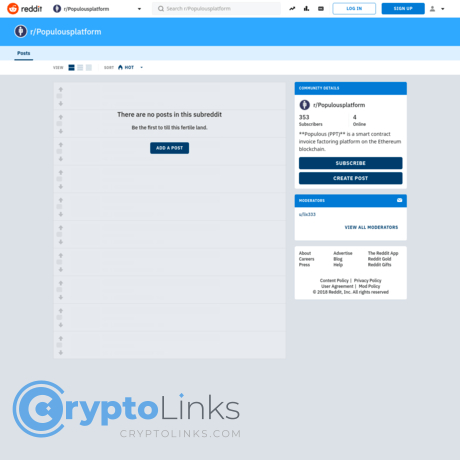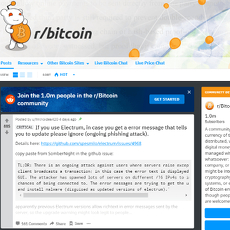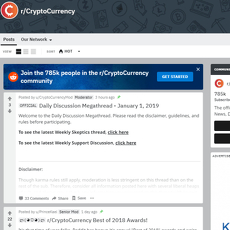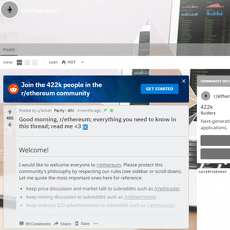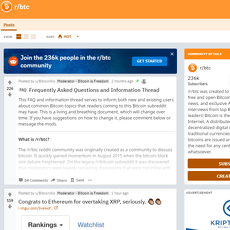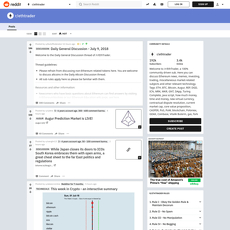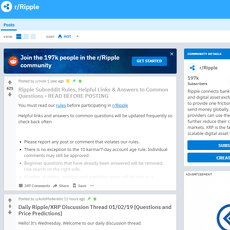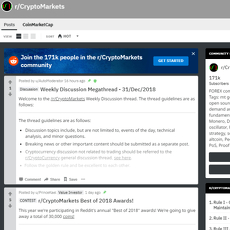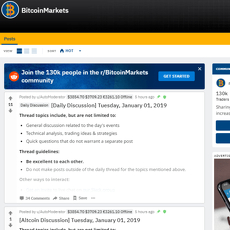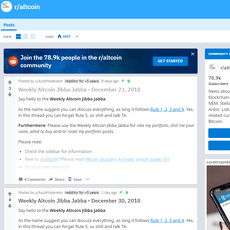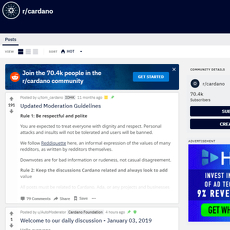r/Populousplatform Review
r/Populousplatform
www.reddit.com
r/Populousplatform Review Guide: Everything You Need to Know + FAQ
Thinking about joining r/Populousplatform but not sure if it’s worth your time? Want to know whether it actually helps you as a holder, trader, researcher, or just someone curious about Populous?
You’re in the right place. I’ve spent years reviewing crypto communities and I’m going to show you exactly what you get from this subreddit, how to get value fast, and what to watch out for—without wasting hours scrolling.
The real problem with crypto subreddits (and why this one isn’t immune)
Crypto subreddits can be a mix of gems and junk. The truth:
- Noise overload: Price-only posts, recycled announcements, and “big news soon” teasers flood feeds.
- Echo chambers: Smaller project communities often reward groupthink and bury skepticism.
- Outdated info: Old threads get resurfaced during pumpy times, and people mistake them for new updates.
- Low-effort charts: TA screenshots without context grab upvotes and attention, but rarely help you act smarter.
Good posts don’t always rise to the top. Research on social news sites shows that a single early upvote can trigger a positive herding effect, boosting visibility regardless of quality (Muchnik, Aral, Taylor — Science, 2013).
And participation is skewed. Most people lurk, a few people steer the conversation. The classic 90-9-1 rule (Nielsen Norman Group) holds up on Reddit: about 1% post the most, 9% contribute sometimes, and the rest mostly read. That shapes what hits the front page—and what you miss.
How I make this useful for you
Here’s my plan to help you skip the fluff and get the good stuff faster:
- Structure: I’ll explain the sub’s layout, flairs, and rules so you can scan smarter.
- Activity: We’ll look at how active r/Populousplatform typically is and what that means for finding timely updates.
- Trust checks: I’ll share a quick checklist I use to separate signal from hype, especially around price talk and “news.”
- Use-case fit: Whether you hold PPT, trade short-term, build tools, or you’re just learning—I'll map exactly how to use this sub without wasting time.
Quick study links:
- Nielsen Norman Group: The 90-9-1 rule
- Science: Social influence bias in online ratings
Who this guide is for
- Holders: You want real updates, not hopium. I’ll point you to sticky posts, quality commenters, and ways to track meaningful changes.
- Short-term traders: You care about sentiment swings, timing, and repeat narratives. I’ll show you how to monitor threads without treating Reddit as a signal service.
- Builders/researchers: You’re after technical notes, docs, and dev chatter. I’ll show you how to surface useful discussions and filter for substance.
- Newcomers: You need context and safe steps. I’ll flag the best places to start and the traps to avoid.
Tip: Whatever your goal, tailor your feed. Use flairs to filter, save high-signal users, and set sorting to “Top” for the last month when you’re catching up after a break.
Quick background on Populous (so the subreddit makes sense)
Populous is a blockchain project that set out to bring invoice financing on-chain—connecting businesses that want to sell invoices for quick cash with backers who fund them. It gained traction during the 2017 crypto wave and has had cycles of hype, quiet stretches, and heated debates like many older projects.
That context matters because most discussions on r/Populousplatform cluster around:
- News and announcements: Releases, partnerships, or platform updates (when available).
- Tech talk: Smart contract mechanics, tokens, and infrastructure questions.
- Price/sentiment: Speculation, chart posts, and “is this still alive?” threads.
- Support: Wallet issues, token questions, and how-tos from users helping users.
Why this matters: smaller project subs can swing from quiet to extremely loud during news cycles. That volatility affects what gets visibility—and how you should read it.
How I tested r/Populousplatform
I took a structured approach so this isn’t just vibes. Here’s what I looked at:
- Post frequency: Are there consistent threads or long quiet gaps?
- Comment quality: Are top comments sourced, or are they one-liners and memes?
- Diversity of topics: Is it only price talk, or is there real discussion on tech, ops, and support?
- Mods and rules: Are low-effort or spammy posts removed? Are flairs used well?
- Newcomer experience: Do first-time posters get useful answers or a shrug?
- Trust signals: Do posters share links to docs, on-chain data, or credible sources? Are timestamps and versions clear?
I also spot-checked patterns around “good news” days to see whether content quality drops when price chatter spikes. In my experience, that’s when echo chambers are most visible and where careful sorting pays off.
Bottom line: if you know what to look for—and what to ignore—r/Populousplatform can save you time and surface relevant updates faster than scrolling X all day.
Want to see how Reddit’s mechanics actually shape what you see on this sub, and which settings make or break your feed? That’s next—ready to check how the platform really works behind the scenes?
What r/Populousplatform is, and how Reddit works behind the scenes
What is Reddit, in simple terms?
Reddit is a giant, user-run forum where each topic lives in its own community called a subreddit. Think of it as a constantly updating feed of links, screenshots, short posts, and long comment threads. People upvote what they like and downvote what they don’t. The more upvotes and recent activity a post earns, the more people it reaches.
Behind the scenes, Reddit’s ranking is time-sensitive and crowd-sensitive. Posts aren’t just sorted by raw votes; a time-decay factor pushes older content down so fresher threads can compete. Early engagement matters a lot—there’s strong evidence that a handful of early upvotes can snowball into much wider visibility, which can skew what you see first.
- Upvotes/downvotes: Signal interest and push posts up or down the feed.
- Sorts: Hot (time + votes), New (latest), Top (most upvoted over a time window), Rising (gaining momentum).
- Karma: A reputation score for users based on how their posts and comments are received.
- Moderation: Volunteer mods and an automated bot called Automoderator enforce community rules.
- Flairs: Labels on posts that categorize content (e.g., News, Discussion, Question) so you can skim for what you need faster.
“Trust, but verify.” In crypto communities, that motto isn’t cynical—it’s protection.
What r/Populousplatform covers
r/Populousplatform is a niche subreddit focused on the Populous project—an invoice-finance concept that’s been through several cycles of hype, pause, and renewed interest. The sub is where holders, curious onlookers, and skeptics trade notes on activity, updates, and lingering questions.
Expect a rotating mix of:
- News and announcements: Exchange mentions, legal or platform updates, and ecosystem rumors. You’ll often see titles like “[News] Any official statement on X?” or “New dev note—legit or recycled?”
- Price/sentiment posts: Charts, on-chain wallet chatter, and “Is this thing alive?” threads when markets swing.
- Support and how-tos: Wallet access issues, token migration history, or “Can someone explain what changed since 2018?”
- Speculation and retrospectives: Long-time holders revisiting old promises vs. present reality, plus newcomers asking for a simple history recap.
On quieter weeks, the feed can slow to a trickle. When anything noteworthy happens—an exchange notice, court filing, or a mention on X—activity spikes quickly. That tempo is normal for small, project-specific subs.
Mods, rules, and flairs
Rules here are typical of crypto subs: keep it civil, don’t spam, no personal info, no referral codes, and be transparent with sources. You’ll likely notice Automoderator catching low-effort link drops and obvious promo. That’s good; consistent rule enforcement keeps the worst shilling out and lets real questions breathe.
Flairs matter more than people think. They’re your fast filter:
- News/Announcement: Quick scan for what’s new or “official.”
- Discussion: Broader debates, takes, and post-mortems.
- Question/Support: Wallet, access, or token mechanics problems.
- Technical: Less common, but useful for dev-minded readers.
Want a shortcut? Use Reddit’s built-in search with flair filtering. For example:
- Top “News” posts (Past Year)
- Latest “Question” threads
Moderation tone feels pragmatic: push back on blatant hype, keep posts on-topic, and funnel repeats into megathreads when they exist. If you see a sticky or a “Read this first” post from mods, it’s worth opening—it often saves you from re-asking something the community already answered well.
Activity snapshot
This is a classic long-tail crypto sub: most days are quiet, and then suddenly a flurry of posts and heated comments when there’s a fresh spark. Comment depth tends to reflect the temperature of the moment—routine questions get a few helpful replies, while controversial claims, legal chatter, or exchange-related issues can fill up fast.
Useful signs the conversation is current:
- Sticky posts updated or rotated by mods
- Recent “Top (Month)” threads with engaged comments and sources
- Crossposts from related subs when broader crypto news touches Populous
One thing to keep in mind: early upvotes can tilt visibility. Peer-reviewed research has shown that a single positive vote in social feeds can increase the final score significantly due to social influence bias (see Muchnik, Aral, and Taylor, PNAS, 2013). Translation: don’t equate early upvotes with quality—open the thread, read the comments, and look for sources.
Types of users you’ll meet
- Long-time holders: They remember every pivot and promise. Their posts often read like mini-archives. When they include links and dates, they’re gold.
- Curious newcomers: Honest questions, basic “what changed?” requests, and wallet or exchange issues. Clear questions usually get the best answers.
- Skeptics/critics: They challenge timelines, governance moves, or communications. Useful for stress-testing claims—especially if they cite sources.
- Loud promoters: High emotion, low detail. Watch for vague superlatives, recycled graphics, and missing links. If a post reads like an ad, treat it like one.
- Problem-solvers: The helpers who drop Etherscan links, archived announcements, or how-to steps. Follow their comment histories; they often show up when it counts.
How I read each group:
- Holders: Ask for timestamps and links; nostalgia without receipts won’t help you.
- Newcomers: Great for spotting common pain points—if the same question keeps popping up, it’s a signal the docs or comms are unclear.
- Skeptics: They’re your free due diligence. Verify their claims just like you would bullish ones.
- Promoters: Look for missing context, disabled comments, or first-time posters pushing bold claims.
All together, these groups create the sub’s “market of ideas.” Some days you’ll get signal. Other days, it’s mostly noise. That’s normal—what matters is knowing how to sort fast, find the few posts that deserve your attention, and keep yourself safe while you’re at it.
Question for you: if a handful of early upvotes can tilt what you see first, how do you find the threads that didn’t get early love but carry real insight? I’ll show you exactly how I subscribe, sort, search, and protect myself next—no fluff, just steps that work.
How to get started fast: subscribe, search, sort, and stay safe
Lurk smart: the 90-9-1 rule
You’ll get better results if you approach r/Populousplatform with the right expectations. Most people read, a smaller group comments, and a tiny group posts. That classic “90-9-1” pattern has been documented for years by usability researcher Jakob Nielsen—meaning a few active users can shape what everyone sees. If the loudest voices are pushing price talk, that’s what dominates your feed, even if the best info sits in quieter threads.
Here’s how I uncover the good stuff fast:
- Don’t stop at Hot. Hot is momentum-driven and repeats familiar narratives. Tap Top → Past Month and Top → Past Year to surface threads that stood the test of time.
- Read comments sorted by “Best” and “New.” “Best” shows highly upvoted insights; “New” reveals fresh corrections and links the crowd hasn’t seen yet.
- Check user histories. Click a commenter’s profile. Consistent sources and balanced tone? Follow them. Pure hype and no links? Scroll on.
- Use Rising during newsy hours. Rising catches early traction without the full hype wave. It’s where you’ll see useful updates before they get buried.
“Trust is earned in screenshots and sources, not in slogans.”
That little rule saves time and money. It keeps your attention on evidence, not emotion.
Sorting and searching that actually works
If you only tweak two things, make it sorting and search. Reddit’s ranking skews toward engagement, not accuracy. You can fix that.
Your quick-start routine:
- Subscribe to the sub and visit via the community tab to avoid the Home feed’s algorithmic noise.
- Set Top → Past Month for a weekly deep read, then hit New once a day to scan fresh posts.
- Bookmark recurring threads (updates, FAQs, support) so you can re-check them without hunting.
Search that actually finds what you want:
- On Reddit search, use operators when possible:
- title: filters by post title. Example: title:roadmap
- author: finds posts by a user or AutoModerator. Example: author:AutoModerator
- flair_name: if the sub uses flairs like Announcement/News/Question. Example: flair_name:"Announcement"
- quotes for exact phrases. Example: "smart contract audit"
- minus to exclude noise. Example: tutorial -price
- If Reddit search feels weak, use Google:
- site:reddit.com/r/Populousplatform AMA
- site:reddit.com/r/Populousplatform "how to" OR tutorial
- site:reddit.com/r/Populousplatform roadmap -memes
- Filter by time in Google’s “Tools” menu (Past year) to avoid outdated takes.
- Sort Reddit results by Top for evergreen content, then by New for breaking updates.
Real examples I actually use:
- site:reddit.com/r/Populousplatform "exchange listing" — checks if a listing rumor has appeared before (and how it panned out).
- author:AutoModerator weekly — finds recurring stickies that the sub relies on.
- title:AMA — zeroes in on Q&A threads (usually packed with links and clarifications).
Why this works: Reddit’s “Hot” favors time + vote velocity, not truth. By switching to Top (time-bounded) and using tight queries, you’re effectively building your own quality filter. Usability research on participation inequality backs this approach—small groups create most content, so your job is to route around the loudest 1% and find the 9% who bring receipts.
Posting etiquette and OPSEC
Staying safe and getting helpful answers go hand-in-hand. Good questions attract good replies; oversharing attracts the wrong people.
- Never share private keys, seed phrases, or API keys. Not in posts, not in DMs, not even “temporarily.” There’s no legit reason anyone needs them.
- Beware unsolicited DMs offering support or “recovery.” Scammers read subs for targets. If someone says “I can fix it,” assume risk.
- Verify “mods” before trusting links. Click the community’s About → Moderators list. Real mods have a shield badge next to their name within the sub.
- Report suspicious content properly. Use the post’s Report button (choose Scam/Spam), then Message the Mods with screenshots and links so they can act fast. More info: How to report.
- Turn on 2FA in Reddit settings and lock down your privacy: Safety & Privacy.
- Use a separate handle if you plan to post wallet screenshots or timestamps that could connect to your identity. Scrub EXIF data from images.
- Ask better, safer questions:
- Include context: what you’ve tried, error messages, links to relevant docs.
- Omit doxxing details: partial wallet screenshots (crop/blur), no unique IDs that tie to your real-life accounts.
When in doubt, assume any off-platform link or “team member” DM is risky until proven otherwise. Your skepticism is a superpower here.
Do you need Reddit Premium?
Short answer: no—you can get full value from r/Populousplatform without it.
What Premium is: an optional subscription that reduces ads, unlocks perks (like r/lounge access and cosmetic goodies), and sometimes adds app features depending on region/app version. Pricing typically lands around $5–7/month (check the in-app price for your country) or a discounted annual plan.
What matters for you:
- All core actions—subscribe, sort, search, post, comment, report—are free.
- Premium can be nice if you browse a lot and want fewer distractions, but it won’t make research more accurate.
- If you buy it, do it for comfort and to support the platform—not because you think it filters scams or boosts credibility. It doesn’t.
If you’re optimizing for signal, your real upgrades are better sorting, smarter queries, and strong OPSEC—not a subscription. As one of my favorite principles goes, “slow is smooth, smooth is fast.” Filter first, then read.
You’re set up to find value. But here’s the sticking point: even with great filters, how do you separate honest insights from coordinated hype and low-effort “reviews”? Want the tells I use to spot red flags in seconds?
Can you trust what you read here? My review framework and red flags
Crypto threads can feel like a casino floor: lights, noise, and a lot of people trying to pull you to their table. Some posts on r/Populousplatform are genuinely helpful. Others are engineered to push a narrative. The trick is learning to tell which is which—fast—before you act.
“Extraordinary claims require extraordinary evidence.” — Carl Sagan
Spotting shills and low-quality “reviews”
Here’s the quick sniff test I use when a post feels a little too excited or oddly vague:
- Timing vs price: A flood of “big news soon” posts right after a sharp price move is a classic tell. Coordinated hype often piggybacks on volatility to look “confirmed.” Cross-check the post timestamp against a price chart on CoinGecko or your exchange.
- No receipts: If there’s no source link, no doc, no dev note, and just “trust me”—don’t. Real updates usually have URLs, commit hashes, or at least a named spokesperson you can verify.
- Account history: Click the username. If it’s brand-new, has little comment karma, or posts the same hype across multiple small subs, treat it as advertising. Look for a pattern of low-effort promos.
- Recycled screenshots: Cropped images with usernames cut off, link shorteners, or “leaked” Discord shots are a red flag. Reverse image search or scan the comments for someone who found the original.
- Comment pattern: Ten accounts replying within minutes with the same phrases (“Huge!”, “To the moon!”, “Don’t miss out”) smells like coordination. Research shows coordinated networks reuse phrasing in tight time windows (Pacheco et al., 2020).
- Promised certainties: “Guaranteed,” “risk-free,” “next week for sure.” Real contributors hedge and provide caveats. Marketers promise.
- Off-platform funnels: Anything pushing you to DMs, Telegram “support,” Google Forms, or wallet connections is not your friend. Report and move on.
Example pattern I’ve seen dozens of times: a thread titled “Major partnership Monday” from a 2-week-old account, no link, a cropped Twitter image, and identical comments repeating a tagline. Sort by “New” and you’ll often find the same phrase posted in other small-cap subs within minutes. That’s not organic community discussion—that’s distribution.
Cross-checking claims the right way
When a post might be real but you’re unsure, use this fast, layered approach:
- Source → Origin: Follow the link to its original source (official site, verified social account, or documented repo). If the proof is a screenshot, find the public post it came from.
- Time → Consistency: Check timestamps. Does the claim align across channels (project X account, GitHub, and site)? Inconsistencies are your early warning.
- On-chain → Numbers: For token claims (supply change, unlocks, new contract), verify on Etherscan or your relevant explorer. Confirm contract addresses through a reputable listing page like CoinGecko before you search the explorer.
- Dev work → Commits: “Development resumed” should show recent commits on the linked GitHub or another repo. No commits + big dev promises = pause.
- Press → Reputation: Coverage on a known outlet with named sources beats anonymous medium posts every time. Beware “press” from sites with no masthead or contact page.
- Security → Links: Run unknown links through urlscan.io or VirusTotal. Phishing in crypto isn’t hypothetical—it’s industrialized.
If it’s a big claim, use the triangle test: one on-chain confirmation, one official channel, and one independent mention. Two out of three is the minimum for me to treat it as “likely.”
Why this works: social media can exaggerate the appearance of consensus when a few loud accounts are highly connected. It’s called the “majority illusion,” and it’s been documented in peer-reviewed research (Lerman et al., 2016). Your cure is external verification.
Moderator quality and rule enforcement
Healthy subs leave footprints. Here’s what I look for on r/Populousplatform:
- Visible rules and active flairs: Clear rules in the sidebar and consistent use of flairs (News, Discussion, Support) help you filter and reduce noise.
- Sticky housekeeping posts: Weekly discussions or megathreads signal the mods are channeling repetitive topics into one place instead of letting spam take over.
- Removal reasons: When low-effort “price to the moon” posts get removed with a reason, that’s a strong reliability signal. If you see endless hype threads lingering, treat the sub as higher risk for misinformation.
- Response to reports: Report obvious scams and see if they disappear quickly. Fast action suggests present moderators. Silence suggests you should raise your guard.
- Automod presence: Auto-comments that warn against DMs or fake support links are a good sign the team knows the common attack vectors.
Moderation doesn’t mean censorship—it’s quality control. If the sub allows everything, you’ll have to do even more filtering yourself.
Community feedback loops
Reddit’s sorting and voting can help you, or trick you:
- Upvotes don’t equal truth: They measure interest and timing, not accuracy. Newcomers often upvote confident, simple narratives. Experts tend to comment with nuance but don’t always win the vote race.
- Sort smarter: Use Top (Week/Month) to find threads that stood the test of time, then switch to “New” and “Controversial” to spot early or debated info that hasn’t been sanitized by groupthink.
- Follow credible commenters: Click into profiles of people sharing sources and corrections. Add them to your mental “shortlist.” You’ll start recognizing voices who consistently add value.
- Use comments as a fact-check layer: Quality pushback in the first 10–20 comments is a strong signal. Silence under a bold claim is often a sign of low reach or orchestrated votes.
- Participate: Thoughtful downvotes and reports actually shape the feed. Crypto scammers rely on passive audiences. Active readers improve the signal for everyone.
There’s good evidence that coordinated groups can manufacture momentum with a handful of accounts, especially in smaller communities (Cresci, 2020). That’s why your personal system—sorting, checking, and saving trusted sources—matters more than the front page.
My quick checklist before I act on any post here:
- Is there a primary source link I can independently open?
- Does on-chain or repo activity match the claim?
- Is the poster’s history consistent with informed participation, not just hype?
- Have credible commenters challenged or confirmed it?
- Would I still act the same way 24 hours from now after more checks?
One more thing I’ve learned the hard way: urgency is a tactic. If a post makes you feel FOMO, slow down. The good stuff will still be true after you verify it.
So with all that in mind, who actually benefits most from r/Populousplatform—and how should you set it up to help your goals, not someone else’s? Keep going; I’ll break it down next with playbooks for holders, traders, and newcomers you can start using today.
Who gets the most value from r/Populousplatform (and how)
Different goals demand different Reddit habits. If you match your routine to what you need—updates, edge, or answers—you’ll save time and avoid the trap of doomscrolling weak takes.
“Trust, but verify.” In crypto, that mindset isn’t pessimism—it’s protection.
If you’re a holder
You don’t need hourly check-ins; you need clean summaries, credible signals, and a way to track what actually changes your thesis.
- Set a monthly routine around “Top (Month).” Sort r/Populousplatform by Top → Past Month to surface the most valuable threads. This tends to capture official notes, meaningful discussions, and post-mortems that would otherwise get buried.
- Watch pinned and sticky posts for official context. Mods usually pin announcements, rules updates, or key links. I check these first—many “breaking” comments are just repeats of what’s already stickied.
- Follow the few who add sources. Tap a user’s profile when they consistently include links to docs, GitHub, on-chain explorers, or reputable news. Hit “Follow” so their comments appear in your Home feed across Reddit.
- Create a lightweight “milestone tracker.” When a thread mentions timelines (audits, listings, releases), save it and call u/RemindMeBot in a reply: RemindMe! 30 days "Check on Populous milestone". It’s simple and it works.
- Use RSS for a calm inbox view. Add /r/Populousplatform/new/.rss to your reader and skim headlines weekly. Less noise, more control.
- Protect yourself from decision fatigue. Research on investor behavior repeatedly shows overtrading hurts long-term returns (see Barber & Odean’s classic study “Trading Is Hazardous to Your Wealth” on SSRN). Holders do better with set check-ins than with constant feed watching.
Real-world example: I save one monthly “Top” post that summarizes community updates or clarifies a rumor, then set a RemindMeBot ping for the next month. That single habit strips out 90% of the FOMO.
If you trade short-term
This subreddit isn’t a signal service, but it can hint at narrative turns and liquidity pockets if you read it like an order book for attention.
- Scan “New” for the first 30 minutes of each hour. Sudden clusters of posts/comments around the same topic—especially if they’re not mirror-posts of a single tweet—can precede volatility. Save the threads; don’t chase the first take.
- Sort “Controversial” when chatter spikes. Polarized comments can mark a sentiment tug-of-war. I look for:
- Specific claims (with links) vs. vague cheers
- Repeat usernames pushing the same angle across multiple posts
- Timing around thin-liquidity hours or weekends
- Track repeat narratives. In small-cap communities, the same storylines recur before big swings: listings, partnerships, audits, unlocks. Keep a one-line note in your journal like “Listings rumor → 2–3 days of chatter → fade” and revisit whether it still holds.
- Anchor to verification habits. Use on-chain explorers, reputable news, and project-owned channels before you move size. Coordinated hype exists in crypto markets (see documented pump-and-dump patterns in Hamrick et al., SSRN), and subreddits can echo that noise unintentionally.
- Know the shelf life of sentiment. Research on attention and price shows social buzz can align with short-lived bursts of volatility rather than durable trends (for example, attention-price co-movements in crypto documented in Kristoufek, PLOS ONE). Treat Reddit as a context stream, not a trade trigger.
Fast setup: Create two browser bookmarks—one for New and one for Controversial. Open both before market-open in your timezone, skim for 3 minutes, then step out. If nothing credible pops up, you just saved yourself an hour.
If you’re new to Populous
Nobody expects you to know everything. People do expect you to show that you tried—because that’s how you unlock the best help.
- Start with explainers and FAQs. Sort by Top → Past Year and search “FAQ”, “beginner”, or “explained”. Read two threads before you post. You’ll ask sharper questions and get better answers.
- Ask like a pro. Include:
- What you’re trying to do (e.g., “Move PPT from wallet X to wallet Y”)
- What you’ve read or tried (links help)
- Error messages or screenshots (with sensitive info hidden)
- Search smart: try site:reddit.com/r/Populousplatform “wallet”, “gas”, “bridge”, or “contract” in your search engine. It often pulls up better results than Reddit’s built-in search.
- Beware unsolicited DMs. If someone messages you first offering “support,” block and report. No legit helper needs your seed phrase—ever.
Template you can copy/paste:
Title: Stuck sending PPT from [Wallet/App] to [Exchange] — fee error
Body: I read [link 1] and [link 2]. Tried [steps]. Getting [exact error]. Screenshots with sensitive info hidden: [imgur link]. Any recent changes I should know about?
That format gets real answers faster because it respects everyone’s time.
Alternatives and complements
You’ll get more out of r/Populousplatform when you pair it with a few high-signal sources and compare notes before acting.
- Related subreddits:
- r/CryptoCurrency for broad market context and sentiment checks
- r/CryptoMarkets for macro, liquidity, and trader-driven chatter
- r/Altcoin for narratives that often spill across small/mid caps
- Project-owned channels: Always grab links from the project’s official website first. If a Discord/Telegram/X link is posted on the subreddit, cross-check it against what’s on the official site to avoid spoofed communities.
- Data and verification:
- CoinGecko for market structure and contract addresses
- On-chain explorers (e.g., Etherscan) to confirm token contracts, holders, and movements
- Reputable crypto news outlets for primary reporting (headline summaries are fine; read the source if you plan to act)
- Cross-channel comparison trick: If a post claims “listing” or “partnership,” you want to see:
- An official announcement on the project’s owned channel
- Matching posts on the partner/listing venue’s channel
- Consistent timestamps across Reddit, X, and the website
Pro tip: If you don’t see matching announcements on both sides of a “partnership,” treat it as unconfirmed. Real deals rarely exist in one place.
None of this is investment advice. It’s how I keep the signal strong and the stress low. Want the exact toolkit I use to filter, verify, and set alerts in minutes instead of hours? The next section has my go-to links and shortcuts—curious which ones will save you the most time today?
Tools, links, and resources to keep you sharp
Essential Reddit how-tos
I’ve tested a lot of flows to make r/Populousplatform useful in minutes, not hours. Here’s the setup that actually works and the exact clicks to get it.
- Lock down your account fast
- Settings → Password and authentication → enable 2FA.
- Settings → Privacy & Security → toggle OFF: Show active status, Allow chat requests from strangers, and Personalize ads.
- Block first, think later: click the three dots on any user → Block user. Scammers can’t DM what they can’t reach.
- Sort the sub for signal
- On r/Populousplatform, set posts to Top → Past Month (or Past Year) for the highest-quality, evergreen threads.
- When you open a post, change the comment sort to New to catch fresh context, updates, and corrections.
- Prefer the clean, fast view? Try old.reddit.com/r/Populousplatform for dense, chronological comment scanning.
- Search like a pro
- Reddit’s built-in search accepts operators. Useful examples:
- title:title:"update"
- author:author:AutoModerator
- flair_name:flair_name:"Discussion" (case-sensitive)
- Examples that work:
- title:"AMA" OR title:"dev update" flair_name:"Discussion"
- author:AutoModerator "weekly" restrict_sr:1
- Google is still king for deep digs. Use:
- site:site:reddit.com/r/Populousplatform tutorial OR guide
- site:site:reddit.com/r/Populousplatform "roadmap" OR "audit"
- Reddit’s built-in search accepts operators. Useful examples:
- Create a custom Populous feed
- In Reddit’s left sidebar, click Create a Custom Feed. Add r/Populousplatform and related research subs you trust.
- Bookmark it. Now you’ve got a one-click Populous research stream without home-feed noise.
- RSS alerts so you never miss threads
- New posts RSS
- Filtered by flair (works on many subs): /search.rss?q=flair%3ADiscussion&restrict_sr=1&sort=new
- Pipe that into an RSS reader, IFTTT, or Zapier to ping your phone on new “Discussion” posts.
- Report and move on
- Click Report on obvious shills/scams → choose It’s spam or Suspicious or scam. Follow up with Message the mods if it looks coordinated.
- Hiding low-value posts trains your feed: three dots → Hide.
Helpful reads and external checks
Good research beats hot takes. These are neutral, battle-tested references I use to read crypto subs with a cold eye.
- How Reddit actually works
- Reddit Help: What is Reddit?
- Reddit Help: Reporting content
- Reddit Help: Premium explained
- How to judge what you’re reading
- SIFT method (Stop, Investigate, Find better coverage, Trace) by Mike Caulfield.
- MIT study (Science): False news spreads faster than true news. Helpful reminder to verify “too good to be true” posts.
- Pew Research: How Americans use Reddit. Puts audience behavior into perspective.
- FTC: How to spot fake reviews. Applies surprisingly well to crypto threads and “product” posts.
- Neutral crypto checkers (use to cross-verify claims, not as gospel)
- Etherscan: paste the official contract address (from the project’s verified site/docs) to review holders, transfers, and contract status.
- CoinGecko and CoinMarketCap: market data, exchange listings, and contract links. Always match contract addresses.
- Dune: community dashboards for on-chain metrics, if available.
- GitHub: check repos, commit cadence, releases, and issues for real development signals.
Safety and verification toolkit
If you only screenshot one thing from this guide, make it this checklist. It saves time and prevents headaches.
Before acting on a post in r/Populousplatform:
1) Author check: Account age, total karma, and comment history. Sudden crypto-only history, copy-paste phrasing, or burst-created accounts = caution.
2) Source check: Links to official docs, signed posts, or reputable outlets? If it’s “a friend said” or a cropped screenshot, treat it as unverified.
3) Timestamp check: Is the info current? Old screenshots and recycled press can mislead during price moves.
4) Cross-verify: Match contract addresses on Etherscan with the project’s official site. Compare news across at least two independent sources.
5) Motivation check: Is this post trying to rush you? Scarcity language, countdowns, and off-platform DMs = walk away.
6) Comment sanity: Sort comments by New to catch corrections or mod notes calling out errors/scams.
- Spotting sockpuppets and coordinated hype
- Look for near-identical comments from fresh accounts, unusual upvote timing, or “echo” posts that push the same bullet list.
- Use Reveddit to see if a thread attracted removed posts (a hint of brigading or spam cleanup).
- Third‑party search like Pushshift search can surface patterns across time. Treat results as directional, not definitive.
- Link safety in two clicks
- Scan suspicious URLs with VirusTotal before you click.
- Use the Wayback Machine to confirm a site’s history (was this “official” page created yesterday?).
- Check domain age and ownership via WHOIS. Typosquats and throwaway domains are common scam tells.
- Crypto OPSEC that actually matters
- Never share seed phrases, private keys, or QR codes. No legit support will ask for them.
- Use a hardware wallet for any non-trivial holdings. Confirm contract addresses on a second device before signing.
- Beware “support” links in comments/DMs. If you need help, go to the project’s official site and navigate to support from there.
- If something feels off, stop and ask the sub—state exactly what link or claim you’re questioning. Crowd scrutiny works.
Extra resources I recommend
- Reddit mechanics: Reddit Help Center
- Misinformation hygiene: SIFT method, MIT “false news” study
- Crypto fact-checking: Etherscan, CoinGecko, Dune, GitHub
- Link safety: VirusTotal, Wayback Machine, WHOIS
- Context on Reddit audiences: Pew on Reddit usage
Want a simple, one-page checklist for judging any r/Populousplatform post—and my straight answer on whether you should trust what you read there? I’ll spell it out next and tackle the most common FAQs head-on. What’s the one question you wish someone had answered before your first Reddit thread decided your trade?
FAQ and final verdict on r/Populousplatform
What is Reddit, and how does it work?
Think of Reddit as a giant set of topic rooms called subreddits. r/Populousplatform is one of those rooms, focused on the Populous project. People post links, text, images, and polls. Others upvote or downvote, which pushes content up or down the sub’s feed. The comments are where you usually find the context, corrections, and extra sources.
There’s a feedback loop here: early votes and comments can snowball attention. Research on social platforms has shown that a single early upvote on a news item can significantly lift its final score due to social influence. In plain English: the first few reactions can shape what everyone sees later, so don’t assume the top post is the most accurate—assume it got the earliest traction.
Can I trust product or project reviews here?
Some are solid and thoughtful; many are just opinions or thin speculation. Treat everything as unverified until it clears a few quick checks:
- Source: Is there a link to official docs, the project’s site, or the partner’s domain (not just a screenshot)?
- Timestamp: Is it current, or is someone recycling 2018 headlines as “breaking news”?
- Author history: Click the username. Do they only post hype during price spikes? Do they engage with questions or vanish?
- Cross-check: Confirm with official announcements, developer repos, or on-chain data where relevant.
Two quick examples I’ve seen work well:
- “New partnership!” Don’t rely on a graphic. Search the partner’s own site or press page. If it’s real, it usually appears on both sides. No mutual confirmation? Assume it’s wishful thinking until proven.
- “Massive listing incoming.” Listings are announced by the exchange on their official X account or blog. Anything else is rumor. Check the exchange’s feed before you get excited.
Rule of thumb: No source, no trust. A single official link beats a hundred excited comments.
One more reason to be careful: studies on crypto pump groups and social hype show that coordinated narratives can move prices briefly—and then mean-revert. That burst of excitement isn’t the same as long-term value. Your defense is simple: verify first, act second.
What is the 90-9-1 rule on Reddit?
About 1% of users post, 9% interact (comment/vote), and 90% mostly read. That means a small group of active users can heavily influence what trends on the subreddit. It’s another reason to browse beyond the front page using sorting (Top for the Month/Year, and New) and to read the comments where the best fact-checking usually lives.
If you’re curious, this pattern is widely documented in online communities and holds surprisingly well across platforms. It explains why some voices seem louder than they are.
How much does Reddit cost a month?
Reddit is free. Premium is optional and gives perks like fewer ads and some extras. You don’t need it to use r/Populousplatform effectively.
Final thoughts and next steps
My verdict: r/Populousplatform is useful if you use it with intent. It won’t hand you guaranteed wins, but it can save you time and surface insights—if you filter properly and verify claims.
- Subscribe and set sorting to Top (Month) for a quick quality snapshot; scan New if you want fresh headlines.
- Read comments before reacting. The best sources and counterpoints often sit right there.
- Check claims against official channels and on-chain or repo data when possible.
- Bookmark reliable posters and recurring quality threads (e.g., stickies, FAQs, dev updates).
- Stay scam-aware: never share keys; ignore unsolicited DMs; avoid off-platform “support” links.
Use it like a radar, not a crystal ball. If you keep your guard up and your standards high, you’ll get the signal without the headache.

